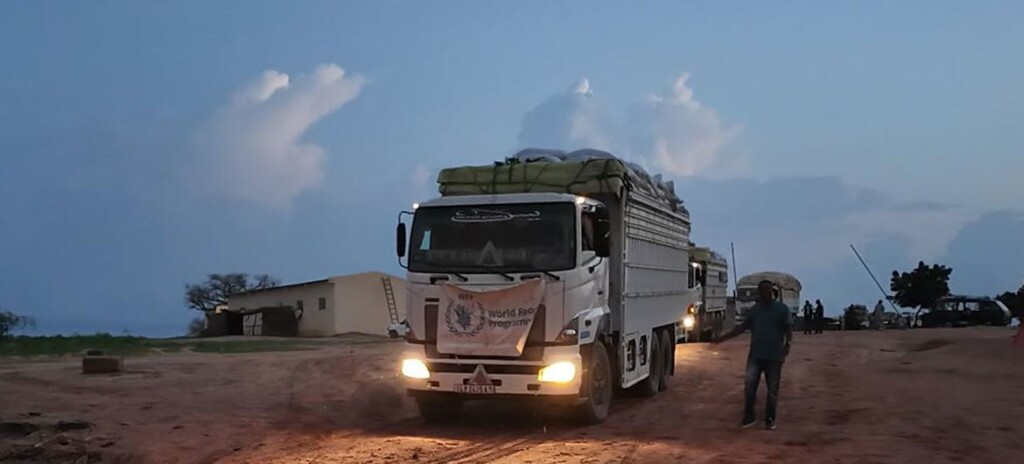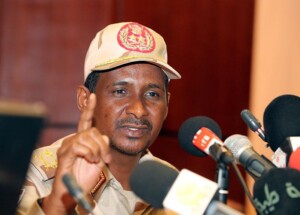UN welcomes decision to keep Adré Sudan-Chad aid corridor open

Convoy of aid trucks on the Adré route in August (Photo credit: WFP / Sylvain Barral)
The United Nations has welcomed the decision announced yesterday (November 13) by Sudanese authorities to extend the opening of the Adré crossing from Chad for three months, so that UN agencies can continue to deliver humanitarian aid to those in need in Sudan.
UN spokesman Stephane Dujarric said that Secretary-General Antonio Guterres spoke with Lt Gen Abdelfattah El Burhan, Chairman of the Sovereignty Council, on the sidelines of the UN Climate Conference in Baku, about this matter and the importance of facilitating the distribution of aid in Sudan, especially through the Adré crossing.
Since the opening of the crossing in mid-August, the United Nations and its partners have transported more than 337 trucks carrying humanitarian aid consisting of more than 11,000 metric tons of food and relief supplies, which can cover the needs of approximately 1.4 million people.
‘30,000 tonnes of supplies are currently in Chad or on their way to the region… – UN spokesman
Dujarric said that the distribution of this aid continues in several locations around Darfur, adding that another 30,000 tonnes of supplies are currently in Chad or on their way to the region.
The spokesman stressed that the Adré crossing is an important lifeline for millions of people, but it is not sufficient to meet all the needs that are growing in Darfur and across Sudan. He stressed the importance of making all necessary routes – including border crossings and transit points on the front lines of conflict within Sudan – available for the urgent and effective movement of humanitarian supplies and relief workers to areas where needs are greatest.
The United Nations Resident and Humanitarian Coordinator in Sudan, Clementine Nkweta-Salami, has also welcomed the decision announced yesterday to continue allowing the delivery of humanitarian aid through the Adré border crossing point from Chad to Darfur for another three months.
“Humanitarians in Sudan welcome this decision as the Adré border crossing is a critical lifeline for hundreds of thousands of vulnerable people across the country, especially in Darfur,” said Ms. Clementine Nkweta-Salami. “Keeping the Adré border open means humanitarians can continue to deliver emergency food and nutrition supplies, medicine, shelter, and other life-saving assistance to hundreds of thousands of hungry, malnourished mothers and children, people suffering from diseases, and others that desperately need these supplies.”
Since the re-opening of the Adré border crossing in mid-August, at least 377 aid trucks have crossed from Chad into Sudan carrying essential supplies for about 1.4 million vulnerable people, including the acutely food insecure and at risk of famine.
The Humanitarian Coordinator has also emphasized the need for additional funds to maintain operations via Adré and scale up efforts to reach more people in need. The US$2.7 billion Sudan humanitarian appeal for 2024 is currently 57 per cent funded, impacting humanitarian’s ability to scale up response. Between January and September 2024, aid agencies reached about 12.6 million people across Sudan with some form of humanitarian assistance
The decision announced yesterday follows appeals by several humanitarian organisations, including the World Food Programme (WFP) to keep the Adré border crossing open.
As reported by Radio Dabanga this week, on Monday, the WFP said that a convoy of trucks, carrying vital medical and food supplies, had crossed from Chad into Sudan. The convoy aims to deliver aid for approximately 12,500 people in Zamzam camp, located in El Fasher, the capital of North Darfur.
UN spokesperson Stéphane Dujarric underscored the importance of the Adré corridor, calling it a “vital lifeline” for providing urgent assistance to families across the Darfur region.
“It is crucial that the crossing remains usable and open for humanitarians to ramp up aid and get a steady supply of aid to communities facing extreme hunger,” he told reporters at a UN daily press briefing in New York.
The Adré border crossing was set to close this Friday if no new agreement was reached to keep it open. Last month, Sudan’s Finance Minister Gibril Ibrahim called for the crossing to be closed “today before tomorrow”, on the premise that the route is used to supply the Rapid Support Forces (RSF).
In August, the Famine Early Warning Systems Network (FEWS NET) declared a famine in Zamzam camp and warned of likely famine conditions in the nearby Abu Shouk and El Salam (also known as Abuja) camps.











 and then
and then